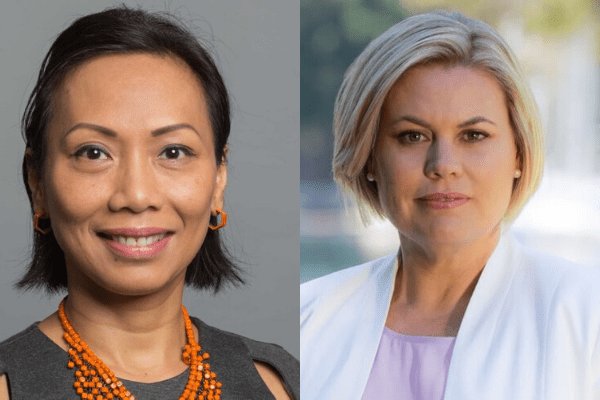You can’t be what you can’t see. But, some of us don’t have the luxury to lean on that adage.
For those of us who are not white, and until recently, not male, this can be an adage that narrows your spectrum of careers. Growing up, Dai Le didn’t see many women, let alone, Asian women, in the seats of politics.
Before entering politics, Le was a journalist with the ABC driven by a desire to tell stories.
“I wanted to write, to discover the world and understand human beings around the globe. My desire was to do that,” she told Licia Heath on Wednesday during a Women for Election In Conversation online discussion.
Le had no compulsion to enter politics or participate in local council, until her husband commented one day. “You wanted to do something different, right? So, why don’t you be the voice? Go into politics?”
But as what she describes as an “atypical Vietnamese refugee” she wasn’t sure.
“I talk more, I have an opinion – more than normal. I didn’t know whether I could fit into politics.”
But Le was not deterred.
“I thought, let me try this. I put my hand up, there was a by-election at that time. I contacted the liberal party and told them I wanted to put my hat in the ring.”
During that first campaign, when Le ran as a Liberal Party candidate, she lost by 1000 votes but she doesn’t consider the attempt as a failure.
“I would like to say I won the election. I missed out by 1000 votes,” she told Heath. “But Cabramatta was the second safest labour seat at 30 percent. I missed by 1000 votes and it doesn’t feel like a loss. My perspective of winning and losing is different and it changes.”
Heath agreed.
“There are many definitions of success,” she said. “Conversations that weren’t going to happen happened because you ran so that’s a success.”
Le and her family arrived in Australia in 1979 as refugees from Hong Kong. They settled in the south-western Sydney suburb of Cabramatta, where, at the time, a surging drug trade coincided with the arrival of thousands of Vietnamese migrants and refugees.
Le was first elected to the Fairfield Council in late 2012, and today, continues to learn the language of politics.
“I’ve had an interesting journey, navigating through the political process,” she said. “I’m still navigating the machinery of a political party.”
Le might not have seen someone who looks like her in her current position while she was growing up, but she’s keen to make changes to the spectrum of voices that are representing her diverse community.
“Here in this region of Sydney, 50 percent of people have at least one parent born overseas. 25 percent are refugee background. Many residents tell me they are grateful for my being on council. They know I understand them. Our mindset and thinking and language is similar.”
Le emphasised the importance of having a strong team to work with, acknowledging that “it takes more than one person. People who have a similar vision and fight for resources and what the community needs.”
“You need that team. I give credit to my team. We are rolling out services and infrastructure. I have said to them, without you, working the ways you work, we won’t see all these things we’ve not seen before.”
When asked about the most effective campaign strategy, Le had a simple response: get your name out there.
“I stood at the state election. I built my profile and I used that momentum. If you haven’t stood before, give it a go, so your profile can be built up. Drive that campaign. Just make sure your face is out there.”
The organisation Heath heads, Women for Election, campaigns to broadcast the perspective of women who have run for office.
She believes sharing knowledge and experience will encourage more women to run and that the lived experience of those from diverse backgrounds will benefit from placing interest back into the process of governance.
“So we can see tangible benefits, and encourage trust in democracy,” she told Le. “It’s about visibility of these faces. Seeing how engaged people get as a consequence of this cannot be understated at all.”
For those thinking of running for office, Le maintains the importance of social media in getting your profile out.
“The emergence social media has enabled elected representatives to be more visible and accountable,” she said. “Voters are now able to access more information and we can see more about these candidates. I am playing to that and utilizing that platform to communicate and engage. Previous politicians didn’t care about engagement; now they have to be prepared to engage to be re-elected.”
“There are opportunities for diversity for elected officials in parliament,” Le continued. “We need to encourage more women to join. This is where the challenge is – to build that pool. We don’t have that pool. We don’t have a diversity of candidates.”
Heath added “There is no lack of talent for women to be community leaders. Women face more barriers. WFE aims to translate what women are doing already in their careers into a political career. The training models we design cater specifically to help women overcome those barriers.”
The most important message Le wanted to impart to women from diverse backgrounds was simple, build your armour.
“Any kind of attack you receive – don’t take personally. Building that resilience takes a few years to develop. I’m lucky I developed that having being a refugee, living in camps, surviving that, learning English, learning the art of storytelling. I failed a lot of times but that is what made me take on criticism and attacks.”


